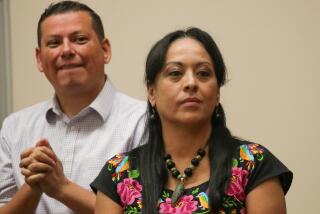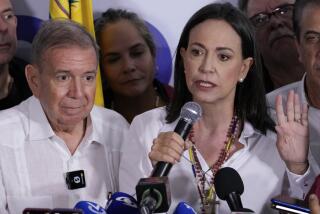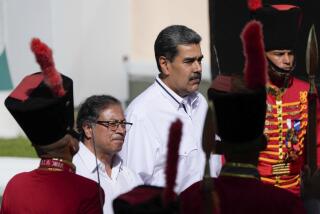Venezuela’s Perez Says He Will End Press Censorship : Media: But editor is doubtful. Pledge comes hours after police raid on opposition newspaper.
- Share via
CARACAS, Venezuela — Hours after scores of Venezuelan security police stormed the office of the major opposition newspaper, President Carlos Andres Perez on Monday finally gave into national and international demands that he call off a campaign against the nation’s press.
Perez had come under severe criticism at home and abroad for trying to prevent the publication of advertisements and commentary linking the Feb. 3 coup attempt by military rebels to popular discontent over worsening economic conditions and official corruption. The government campaign to quash the unfavorable publicity culminated in a raid early Monday by security police officers on the opposition daily, El Nacional.
Although Perez says he was merely trying to prevent the media from lionizing the military rebels, besieged editors responded that the president’s crackdown was aimed at eroding freedom of expression in one of South America’s most stable democracies.
“This is the gravest government assault on liberty that Venezuela has suffered in 34 years of democracy,” El Nacional Editor in Chief Alfredo Pena said in an interview hours after the raid. “The government was not satisfied with censoring us. It had to send its agents in a violent assault on private property.”
As Pena spoke from El Nacional’s downtown offices, scores of black-clad agents from the security police were preventing delivery trucks from leaving the building’s garage. The agents were finally called away late Monday after Perez agreed to lift press censorship in a meeting with editors and producers from the media.
El Nacional’s delivery trucks hit the streets as 200 bystanders, many of them employees of the paper, looked on and cheered.
Argenis Martinez, El Nacional’s managing editor, said the jubilation was mixed with fear of future measures. “The word of the government is always betrayed by its actions,” Martinez said in a telephone interview. He said Perez is only acting to placate international critics and will seek more subtle ways of pressuring newspapers.
Earlier in the week, the security police moved against other publications, including Zeta magazine and the El Nuevo Pais newspaper, both owned by Rafael Pulleo, one of Perez’s most fervent opponents. Pulleo fled to America late last year after the government charged him with falsely accusing security forces of raiding his home.
Perez has found his hand strengthened against opponents as a result of a series of security measures approved by Congress the day after the coup attempt. Constitutional guarantees, including freedom of expression, were suspended, and police need no warrants to raid offices, detain suspects and tap phone lines.
In recent days, the government has sent censors from the Interior Ministry to almost all of the capital’s newspapers to prevent publication of photos of coup leaders or commentaries blaming the uprising on bad government.
The censorship was stepped up after Friday, when El Nacional published a full page advertisement in which a retired general and other officers blamed the coup on bad government during the past four presidential administrations. The retired officers were arrested hours after the ad appeared.
More to Read
Sign up for Essential California
The most important California stories and recommendations in your inbox every morning.
You may occasionally receive promotional content from the Los Angeles Times.













